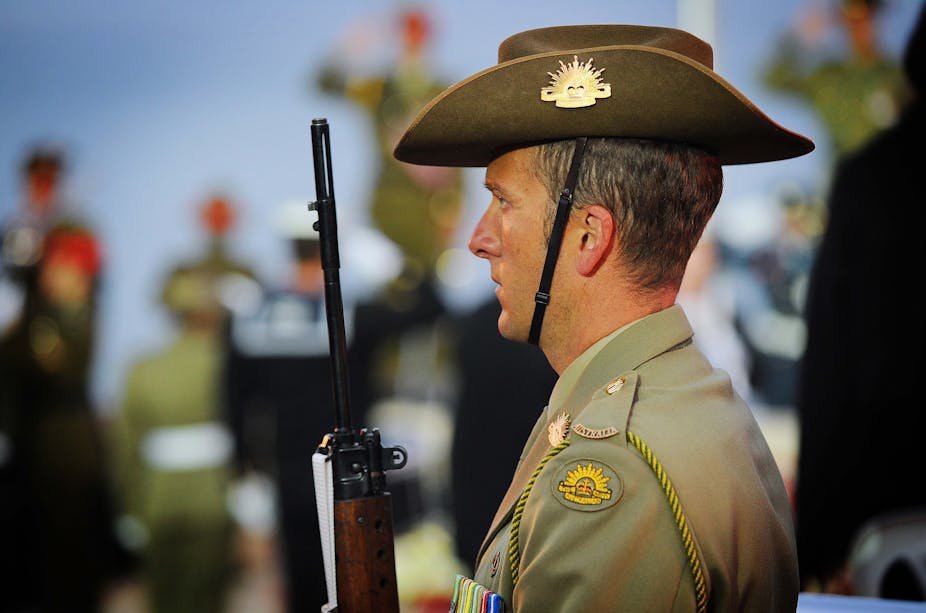Last week, the Commonwealth Attorney-General Nicola Roxon introduced a bill establishing the Australian Military Court as a constitutional court.
If the bill passes, it will bring Australia into line with our international human rights obligations to give every person a trial before a competent, independent and impartial tribunal.
But some argue that there are drawbacks to having a separate military system and the new bill could have constitutional weaknesses. Now is the time to ask – do we need or want a constitutional Military Court?
A constitutional exception
Historically, Australia’s defence force personnel have been subject to discipline and justice through the service tribunal system: a closed, in-house system operating within the chain of command.
The system is composed of courts martial (a panel of serving officers and a serving legal officer), Defence Force Magistrates (military legal officers) and summary authorities (serving officers). Convictions and sentences under this system are automatically reviewed within the chain of command.
Under the Commonwealth Constitution there is a general rule based on the separation of powers that judicial power (and particularly the power to determine guilt and punish criminal offences) must be exercised by a constitutional court.
A constitutional court must exhibit a number of characteristics – particularly, they must be comprised of independent and impartial judicial officers, with security of tenure and remuneration. Military justice has historically operated outside of this without judicial officers.
The first Australian military court
There have been a number of calls for legislative amendment to the military justice system, the most important was in 2005 when the Senate Foreign Affairs, Defence and Trade References Committee recommended the creation of a constitutionally constituted specialist military court.
In 2007, the Howard Government responded to the Committee’s recommendations by establishing the Australian Military Court (AMC). The first AMC exhibited some of the characteristics of a constitutional court, and automatic review of the AMC’s decisions by the chain of command was removed.
The first iteration of the AMC contained substantial improvements in terms of independence, but it fell short of being comparable to a federal court. One example of this was the military judges, who didn’t enjoy the constitutionally prescribed level of independence. Appointment was for ten-year, non-renewable terms. During that term, judges were independent from the chain of command, but they then returned to the chain of command.
The first AMC was challenged in 2009 by former Navy sailor, Brian George Lane. Unanimously, the High Court found the AMC invalid. It seemed the Commonwealth either had to stick with the service tribunal system, or have a fully independent court system. The move towards independence away from the chain of command had rendered the AMC unconstitutional.
The government’s immediate response to the decision was to revert back to the old service tribunal system.
The second Australian military court
The new bill establishes the Australian Military Court as a constitutional court; although it remains separate from the civilian system. One of the main changes is that judicial officers are not serving defence force officers but appointed under the terms dictated for a federal court judge by the Constitution.
The AMC will try serious service offences, although there is no provision for trial by jury. Constitutionally, there is a right to trial by jury for Commonwealth indictable offences. Trials in the AMC are able to avoid this requirement because offences are not presented on indictment, even though they can extend to serious criminal activities, including murder and sexual assault. While a number of reasons are proffered by the Attorney-General as to why this has been done, it underscores the frailties of the constitutional right.
The new AMC has already been criticised. So what are the costs of establishing the AMC as a constitutional court?
Different enough?
There are two principle justifications why military discipline and justice should be separate from and different to the civilian system. The first is that a military tribunal must be composed of members with special knowledge of military processes, culture and context. The second is that a military tribunal must be capable of being convened overseas during times of hostilities.
I do not deny that the defence force requires a separate disciplinary code and an effective and expeditious tribunal system. However, I have never been convinced that these reasons necessitate a separate military justice system that lacks the guarantors of independence developed in the civilian context. Indeed, the new bill has easily responded to these concerns within the framework of a constitutional court.
It is strained to say understanding the complexities of military culture and context is more difficult than understanding the complexities of specialist scientific or medical evidence in a civilian trial. The bill even provides that judges, by reason of experience or training, understand the nature of service in the Australian Defence Force.
In response to the second concern, the legislation provides that the AMC is able to sit overseas and in theatre; when it is unable to do so, a back-up system of courts martial and defence force Magistrates can be convened.
Will it last?
There may be one more argument against the AMC: it could be unconstitutional. The question of whether military discipline can be taken away from service tribunals and given to a constitutional court is in untested legal waters.
There is an argument that this may undermine the Governor-General’s command of the military forces, conferred directly by the Constitution. This was raised in the first AMC challenge, but the High Court avoided it because the first AMC was not a constitutional court.
It could be this technical constitutional argument that brings down the second attempt to bring greater independence and transparency to the discipline of our defence force.

